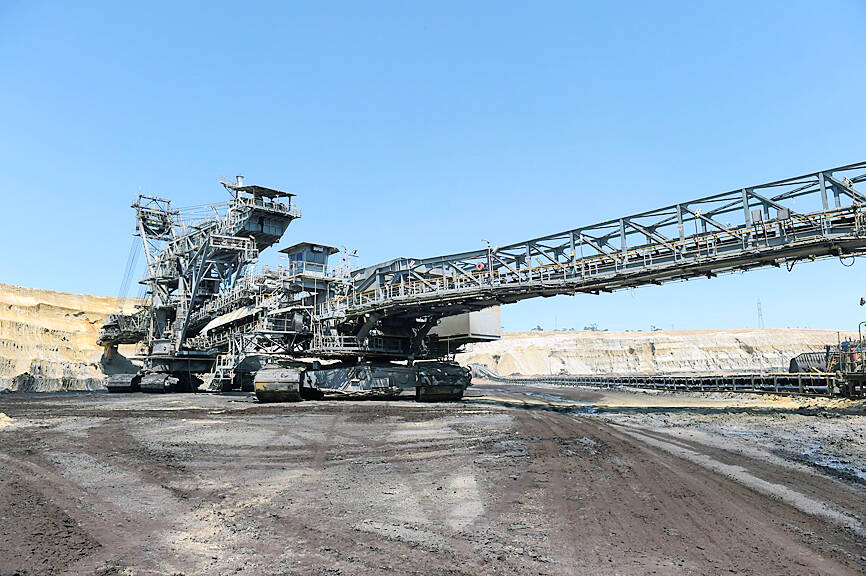Australia yesterday predicted that its coal exports would halve in value over the next two years, as prices fall and consumers look to alternative sources of energy.
Shipments of thermal coal — used in electricity production — would be worth US$20 billion, down from US$43 billion this year, the Australian Department of Industry, Science and Resources said.
The forecasts showed a spectacular drop for a sector long championed by politicians and industry figures as a mainstay of the Australian economy.

Photo: Bloomberg
Australia is the world’s second-largest exporter of thermal coal, after Indonesia, and the largest exporter of metallurgical coal, which is used in steelmaking.
“Global supply and demand for thermal coal have peaked,” the department said, forecasting price declines after spikes caused by the COVID-19 pandemic and Russia’s invasion of Ukraine.
Demand from China — the world’s largest coal importer — is expected to begin a “long-term decline” starting next year, it said.
However, the forecast said that the pace of the declines in the coal market “is likely to be uneven” and volatile, adding that “the gradual withdrawal from thermal coal usage is likely to affect lower-grade and higher-polluting blends in the first instance.”
The report also predicted a continued boom for materials such as nickel, manganese, cobalt and lithium used in batteries.
Exports of those commodities are expected to pass US$27 billion per year, eclipsing the value of thermal coal exports, a sign of how new technologies and emission reduction targets are changing energy markets.

SEEKING CLARITY: Washington should not adopt measures that create uncertainties for ‘existing semiconductor investments,’ TSMC said referring to its US$165 billion in the US Taiwan Semiconductor Manufacturing Co (TSMC, 台積電) told the US that any future tariffs on Taiwanese semiconductors could reduce demand for chips and derail its pledge to increase its investment in Arizona. “New import restrictions could jeopardize current US leadership in the competitive technology industry and create uncertainties for many committed semiconductor capital projects in the US, including TSMC Arizona’s significant investment plan in Phoenix,” the chipmaker wrote in a letter to the US Department of Commerce. TSMC issued the warning in response to a solicitation for comments by the department on a possible tariff on semiconductor imports by US President Donald Trump’s

The government has launched a three-pronged strategy to attract local and international talent, aiming to position Taiwan as a new global hub following Nvidia Corp’s announcement that it has chosen Taipei as the site of its Taiwan headquarters. Nvidia cofounder and CEO Jensen Huang (黃仁勳) on Monday last week announced during his keynote speech at the Computex trade show in Taipei that the Nvidia Constellation, the company’s planned Taiwan headquarters, would be located in the Beitou-Shilin Technology Park (北投士林科技園區) in Taipei. Huang’s decision to establish a base in Taiwan is “primarily due to Taiwan’s talent pool and its strength in the semiconductor

An earnings report from semiconductor giant and artificial intelligence (AI) bellwether Nvidia Corp takes center stage for Wall Street this week, as stocks hit a speed bump of worries over US federal deficits driving up Treasury yields. US equities pulled back last week after a torrid rally, as investors turned their attention to tax and spending legislation poised to swell the US government’s US$36 trillion in debt. Long-dated US Treasury yields rose amid the fiscal worries, with the 30-year yield topping 5 percent and hitting its highest level since late 2023. Stocks were dealt another blow on Friday when US President Donald

UNCERTAINTY: Investors remain worried that trade negotiations with Washington could go poorly, given Trump’s inconsistency on tariffs in his second term, experts said The consumer confidence index this month fell for a ninth consecutive month to its lowest level in 13 months, as global trade uncertainties and tariff risks cloud Taiwan’s economic outlook, a survey released yesterday by National Central University found. The biggest decline came from the timing for stock investments, which plunged 11.82 points to 26.82, underscoring bleak investor confidence, it said. “Although the TAIEX reclaimed the 21,000-point mark after the US and China agreed to bury the hatchet for 90 days, investors remain worried that the situation would turn sour later,” said Dachrahn Wu (吳大任), director of the university’s Research Center for